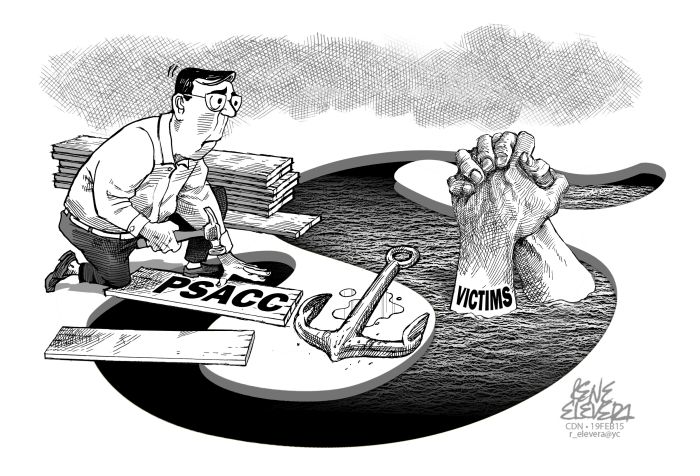The Maritime Industry Authority’s (Marina) decision to cancel the certificate of public convenience for Philippine Span Asia Carrier Corp. (PSACC) to transport passengers was a long time coming.
More than six years had passed since the sinking of the MV Princess of the Stars.
The company Sulpicio Lines Inc. changed its corporate name soon after to distance it’s business from the stigma of losing a vessel during a typhoon and, more importantly, 200 lives of passengers and crew, with more than 500 still missing and feared dead.
Full justice continues to elude families of the victims, a few of whom have persevered wtih court claims.
The Marina’s decision on the complaint filed by families in the sea tragedy took all of four years to make.
Why it took so long decide – and get overtaken by corporate moves to save the company’s remaining fleet – is hard to explain, and deepens in the public mind the belief that justice is slower for passengers, who don’t have the wherewithal to sustain a legal battle.
But chief among those reasons is economics.
PSACC or Sulpicio Lines Inc. is one of several shipping firms that cater to a substantial market of passengers who prefer sea travel as safer and more affordable than planes, despite the many promos launched by airline companies.
The Marina cancellation of their certificate of public convenience limits PSACC to carrying only cargoes. Even that limitation doesn’t guarantee that the former Sulpicio Lines Inc. is immune from accidents due to crew negligence as seen in the August 2013 mishap where one of their vessels, the Sulpicio Express Siete collided with the MV St. Thomas Aquinas off Talisay City which resulted in the loss of more than 500 lives.
The Marina decision is not the end of the line for the ship owners, who already had their heyday.
What remains is a moral and social obligation to provide for the families whose loved ones are forever gone because of their failure to ensure safe passage.
One would think that after Sulpicio’s MV Doña Paz accident that claimed 4,300 lives and holds the record of being the single worst maritime tragedy in peacetime in history, the company had filled its share of tragedy and learned from it.
Even before the Marina decision was released, the company had already left the passenger business to focus on weekly cargo voyages.
Cebu is the hub of about 80 percent of the country’s maritime transportation and cargo services. With one less provider, if this would result in improved services for the riding public, then so be it.
